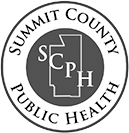Background
Summit County Public Health has been providing mosquito control services to the residents of Summit County for 45+ years. The program, which began in 1976, was a response to LaCrosse encephalitis outbreaks within the county.
Due to the West Nile Virus (WNV) outbreak in the U.S. in 1999, SCPH increased its focus on surveillance to detect mosquitoes carrying disease. Surveillance consists of setting 21 strategically located mosquito traps per day in Summit County. The mosquitoes are sent to the Ohio Department of Health for testing for West Nile Virus. This provides SCPH with information on locations of any infected mosquitoes within the county and where to best focus our mosquito reduction efforts.
In recent years, SCPH has transitioned away from using organophosphate-based pesticides to more environmentally friendly and less toxic products. Currently SCPH is using bacteria-based products to help control larval mosquito populations as well as the least toxic adulticide spray available to the industry. These products are effective at controlling mosquito populations while having very limited impact on non-target species.
In addition, SCPH is excited to announce that we are integrating specialized computer software into our program which will help us increase program efficiency while better helping to identify areas where mosquito activity may impact human health.
SCPH continues to provide education to the public on mosquito breeding sites around the home, mosquito testing for encephalitis, treating areas of standing water for mosquito larva, and evening spraying in areas where mosquitoes are cause for concern.
Program Goals
The goals of the SCPH Mosquito Control program are:
- To reduce the number of disease-carrying and pest mosquitoes in a cost-effective and environmentally-responsible manner.
- To educate the public on methods of cultural practices that will reduce the number of mosquito breeding sites and methods to reduce the feeding activities of mosquitoes.
- To have the ability to monitor mosquito populations in Summit County for mosquito-borne diseases and determine population levels for pest species.
Program Components
The SCPH Mosquito Control program has four components:
- MOSQUITO EDUCATION & INFORMATION
Summit County Public Health (SCPH) provides information to the public on matters such as mosquito ecology, vector-borne disease information, proper cultural practices for mosquito larva reduction, and mosquito control methods used by the Mosquito Control Program. To obtain this information call Summit County Mosquito Control at (330) 926-5669 Monday through Friday from 8am to 4pm.
- MOSQUITO SURVEILLANCE
Surveillance identifies locations where mosquito populations are building, so targeted control measures can be implemented before a problem exists. The object of this program is to collect mosquito specimens for shipment to the Ohio Department of Health for mosquito-related encephalitis testing. Thousands of Culex specimens per year are submitted from the District and are tested for West Nile Virus and St. Louis encephalitis. These mosquitoes are collected using gravid traps. The District has 181 trap sites in the county and over 500 traps are set at these sites each summer.
- MOSQUITO LARVICIDING
Larviciding is the addition of chemical or other products to a water source to kill mosquito larvae and pupae. The purpose of the program is to reduce the number of mosquito larvae by treating breeding sites from May through September. Presently, there are over 1,300 sites totaling over 600 acres within Summit County that are inspected, with each receiving treatment up to 3 times during the season. Currently, SCPH utilizes naturally occurring bacteria so as to have minimal impact on the environment, including non-target species. To report areas of standing water (mosquito breeding sites), please call (330) 926-5669.
- MOSQUITO ADULTICIDING
The goal of this program is to reduce the number of adult disease carrying and pest mosquitoes by evening spraying of residential areas with ultra low-volume (ULV) mist spray equipment. Adulticiding is the last line of defense in the control of mosquitoes. Other methods of mosquito control such as source reduction and aggressive larviciding should be considered first. Using the system of integrated pest management, the decision of when and where to spray is based on our mosquito surveillance program. SCPH sets out 21 traps per night in Summit County to determine the location of areas of disease and mosquito activity.
Read these frequently-asked questions about mosquitoes:
